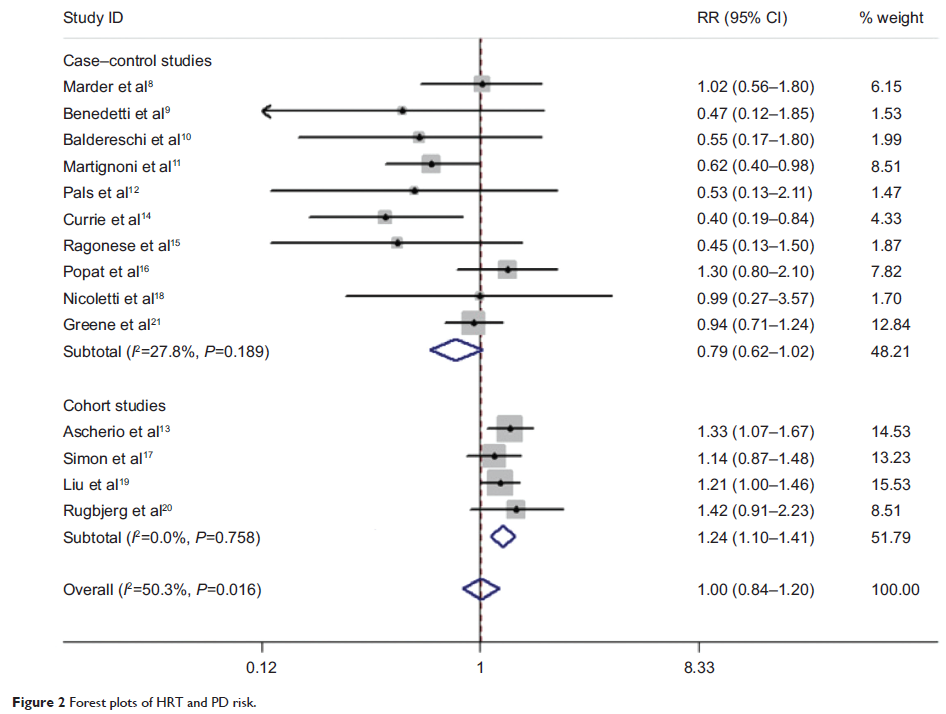108605
论文已发表
注册即可获取德孚的最新动态
IF 收录期刊
- 3.4 Breast Cancer (Dove Med Press)
- 3.2 Clin Epidemiol
- 2.6 Cancer Manag Res
- 2.9 Infect Drug Resist
- 3.7 Clin Interv Aging
- 5.1 Drug Des Dev Ther
- 3.1 Int J Chronic Obstr
- 6.6 Int J Nanomed
- 2.6 Int J Women's Health
- 2.9 Neuropsych Dis Treat
- 2.8 OncoTargets Ther
- 2.0 Patient Prefer Adher
- 2.2 Ther Clin Risk Manag
- 2.5 J Pain Res
- 3.0 Diabet Metab Synd Ob
- 3.2 Psychol Res Behav Ma
- 3.4 Nat Sci Sleep
- 1.8 Pharmgenomics Pers Med
- 2.0 Risk Manag Healthc Policy
- 4.1 J Inflamm Res
- 2.0 Int J Gen Med
- 3.4 J Hepatocell Carcinoma
- 3.0 J Asthma Allergy
- 2.2 Clin Cosmet Investig Dermatol
- 2.4 J Multidiscip Healthc

激素替代疗法的女性患帕金森病的风险:一个对 14 项观察性研究的综合分析
Authors Wang P, Li J, Qiu S, Wen H, Du J
Published Date December 2014 Volume 2015:11 Pages 59—66
DOI http://dx.doi.org/10.2147/NDT.S69918
Received 24 June 2014, Accepted 5 August 2014, Published 31 December 2014
Background and purpose: Published
data on the relationship of hormone replacement therapy (HRT) with Parkinson’s
disease (PD) were inconclusive. Thus, a systematic meta-analysis of
observational studies was performed to clarify this topic.
Methods: The databases of
PubMed and EMBASE were searched for case–control or cohort studies published up
till June 2, 2014. Meta-analysis of the relative risks (RRs) with 95%
confidence intervals (CIs) was estimated using random-effects models.
Results: A final total of ten
case–control and four cohort studies were included in our meta-analysis. The
overall combined RR of PD for ever users versus never users of HRT was 1.00
(95% CI: 0.84–1.20). Limited to those subjects who only use estrogen, a similar
trend was detected (RR: 0.95, 95% CI: 0.69–1.30). In the subgroup analysis by
study design, no significant association was observed in case–control studies
(RR: 0.79, 95% CI: 0.62–1.02), whereas a positive association was found in
cohort studies (RR: 1.24, 95% CI: 1.10–1.40). In further analysis according to
study quality, an inverse association was found in the low-quality group (RR:
0.58, 95% CI: 0.40–0.82), whereas a positive association was found in the
high-quality group (RR: 1.16, 95% CI: 1.02–1.31).
Conclusion: In summary, our
results of meta-analysis do not support a protective role of HRT in female PD
development.
Keywords: Parkinson’s disease,
hormone replacement therapy, hormone meta-analysis
